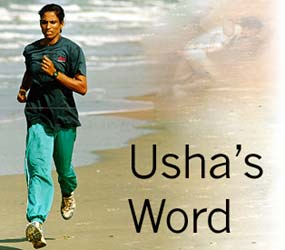Home > Sports > Athens 2004 > Columns > P T Usha

Sounds impossible, but Anju can do it
August 27, 2004
The last two days in Athens were thoroughly enjoyable. The level of competition in athletics was so good that I was left on the edge of my seat for several hours on both days. And no one perhaps was happier than me when I left the stadium on Wednesday night.
Our Anju Bobby George could achieve her first goal and become the first Indian woman athlete after me to reach the final of an Olympic athletics event. India still has a hope of winning another medal in this Olympics.
There were several things about Anju that impressed me a lot. Firstly, she did no go all out and cleverly reserved her best for the final. She jumped to 6.69m in the very first attempt, which was enough to reach the final. I saw Anju picking up her belongings and slowly walking back to the dressing room. She did the right thing. There was no need to exert herself anymore.
Continuous participation and training in the European circuit has helped Anju immensely. Previously, she had a habit of committing fouls in the first jump. But on Wednesday night, she did it absolutely clean. She had a slow run-up and a changed angle, but that could not deter her from achieving her initial target.
The final, of course, would be a completely different ball game. There are at least seven girls, who did better than Anju in the heats. To beat them for a medal Anju needs to jump minimum .20m more. To many, it may sound impossible, but, mark my word, Anju can do it.
The long jump is a kind of event where performance can vary on each given day. Who knows, Anju may jump to her career best on Friday.
Another thing I noticed is that Anju seems to be a loner out there in the middle. There were other competitors, I could see from the stands, who were discussing among each other before and after every jump. Anju was an exception. She looked too engrossed with herself and hardly talked to anyone around. In a way, it is good also as it helps to concentrate more.
In long jump, the participants were interacting before and after the jumps. In the 3,000m steeplechase, I was amazed to see that the three Kenyans – Ezekiel Kemboi, Brimin Kipruto and Paul Kipsiele – were talking to themselves even during the race! I could not believe my eyes. Can someone take an Olympic race so casually? And, finally, the three ran away with all the three medals. Such domination is rarely seen in international athletics.
I was greatly thrilled to watch Morocco's El Guerrouj in the 1,500m final. He was simply too good. In Sydney, I remember Guerrouj losing to Kenyan Bernard Lagat in the last 100 metres even after leading the pack for most of the time. But here, the Moroccan did not allow himself to commit the same mistake. In the last 20 metres, I could see from the stands, that El Guerrouj put all his energy into the finish to savour a great moment of his great career. This was the only medal that was eluding him all these years. Now, he as accomplished his mission.
While there had been a lot of uproar about judging in gymnastics, one thing I must say is the US athletes too are getting some undue advantage. The timings of the events have been prepared entirely to suit the television network in the US. Never in all these years have I seen the events being held so late in the evenings. I watched quite a few yawning faces even among the officials and participants. The bigger and powerful nations always get an advantage in every walk of life, but this has been too blatant. The other nations should make a strong protest on this issue.
But nothing could beat the thrill of watching the women's pole vault competition. Russia's Yelena Isinbeyeva set a world record by one cm (4.91m) and left her compatriot Svtlana Feofanova to remain content with overhauling the Olympic record and the silver medal.
It was a competition that instantly reminded me of Sergei Bubka. He, too, like the Russian girl, was simply the master, capable of taking up any challenge thrown at him. It was a terrific experience and would be etched in memory for long.
Previous column: Shobha made us all proud